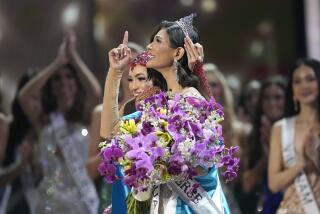Bush Criticizes U.S. Demonstrators in Managua
- Share via
WASHINGTON — President Bush, clearly exasperated by Americans who have protested outside the U.S. Embassy in Managua, lashed out Thursday at American supporters of the Nicaraguan Sandinistas, saying they should accept the results of last month’s election if they “want to help the people.”
In a question and answer session with a newspaper publishers’ group at the White House, Bush also praised Soviet President Mikhail S. Gorbachev and repeated U.S. hopes for a “peaceful evolution” of the dispute over Lithuanian independence. Bush sent Gorbachev a letter Thursday congratulating the Soviet leader on his election Wednesday to the country’s newly powerful presidency, spokesman Marlin Fitzwater said.
Bush’s remarks about Americans in Nicaragua, coming in answer to a question that was only peripherally related, were unusual because he seldom goes out of his way to involve himself in ideological disputes. Recent news reports about protests at the embassy in Managua, however, appear to have disturbed him.
Over the last several years, thousands of Americans--from church and peace groups as well as leftist political organizations--have traveled to Nicaragua to work on Sandinista agricultural cooperatives and other government-supported projects. Many of them have participated in weekly demonstrations outside the U.S. Embassy that have been going on for years.
Now, many are protesting President Daniel Ortega’s election loss last month. The demonstrators allege that opposition candidate Violeta Barrios de Chamorro won the election because of U.S. pressure.
“I am frustrated a little bit” by those criticisms, Bush said. The groups traveled to Nicaragua “allegedly to help the people of Nicaragua, and then Nicaragua has a free and fair election, and it turns out these people were interested in helping the Sandinistas,” he said.
“We’ve been expecting him to try to do this,” said Dennis Marker in the Washington office of Witness for Peace, one of many groups that have sent Americans to Nicaragua over the last decade. “The reason people are protesting at the embassy is not because of who won the election, but because of the destructiveness of U.S. policy.”
Since the election, Marker said, some members of Chamorro’s coalition have threatened to expel Americans who traveled to Nicaragua when the Sandinistas were in power. Bush’s remarks could lend support to that effort, he said.
By contrast with his comments on Nicaragua, Bush had only positive words about Gorbachev, whom he referred to as a “reasonable man.”
Asked if he was worried about the extensive new powers Gorbachev will now have, Bush answered, “They’ve come out of the totalitarianism of the past. They give the new President great power, but I don’t see it as a threat.”
Asked about U.S. policy toward Lithuania, which has declared its independence from the Soviets, Bush said, “There are certain standards of control over one’s country or . . . territory that guide recognition.”
“The best role for the United States,” he said, “is to encourage a peaceful evolution from now on.” Bush praised Soviet officials for saying they would not use force to try to resolve the dispute over Lithuania’s status.
Bush also said he remains opposed to the idea of cutting foreign aid to Israel and Egypt to provide more money for other countries, but he repeated his appeal to Congress to give him more discretion in how to spend foreign aid funds.
More to Read
Sign up for Essential California
The most important California stories and recommendations in your inbox every morning.
You may occasionally receive promotional content from the Los Angeles Times.














